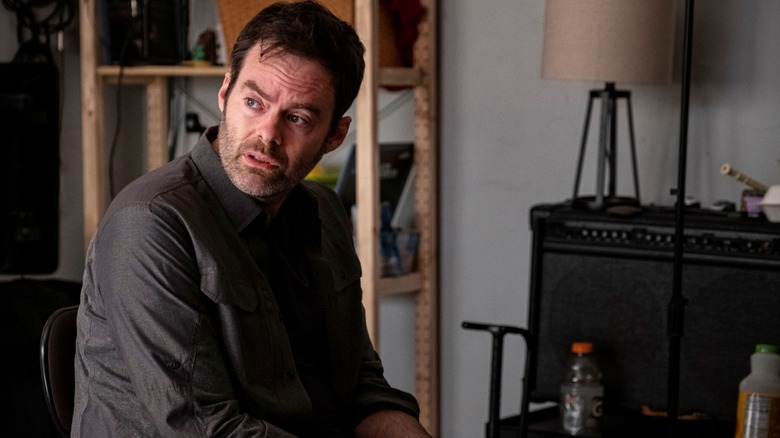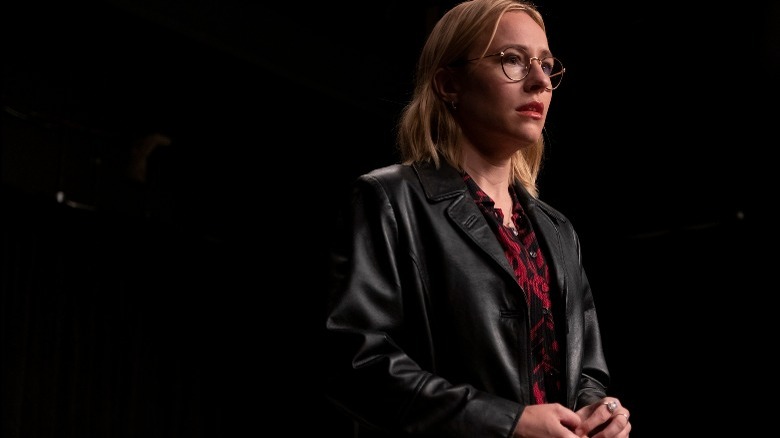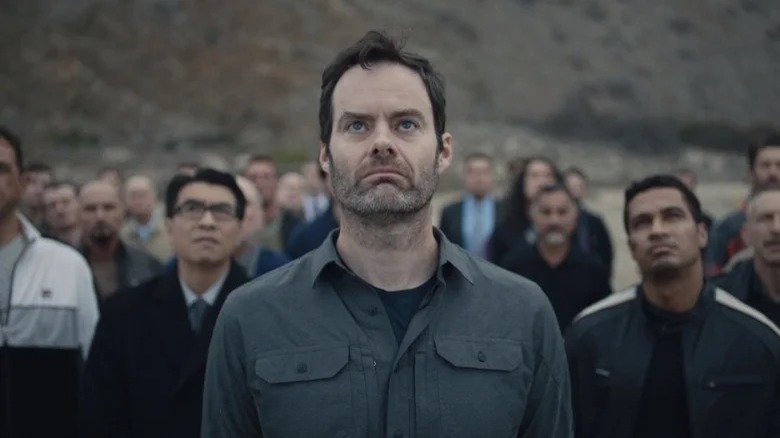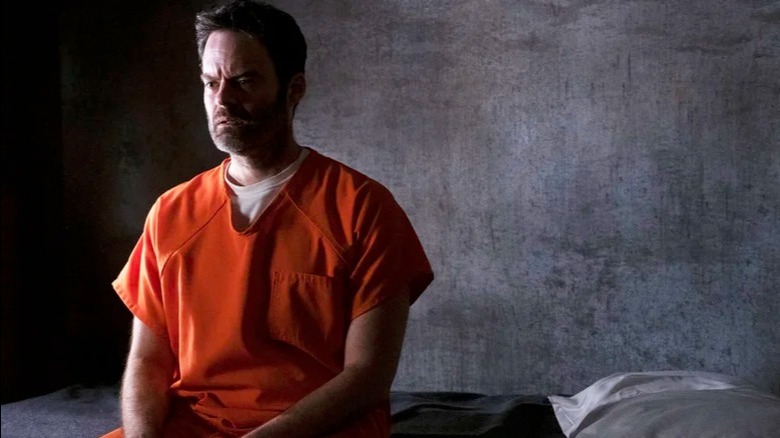Barry's Surprising Personal Pivot Actually Makes Sense
This post contains spoilers for the latest episode of "Barry."
There's a hell of a lot to digest in the latest episode of "Barry." Series star and co-creater Bill Hader warned us weeks ago that the final season of the hitman comedy would be "structurally radical," but I'm guessing most fans didn't anticipate that the radical choice would be an eight-year time jump delivered mid-season, after one of the show's most heartbreaking episodes. That's exactly what we got, though, as "Barry" picked up its story this week with a new timeline, new identities, and a whole new life for its lead characters.
"Barry" episode five asks fans of the show to come to terms with a whole lot of changes. Barry and Sally (Sarah Goldberg) have a son now, a boy who lives with them in their isolated home where his dad makes sure he remains afraid of everything from video games to baseball. Sally goes to work at a diner where she wears a black wig, fakes a Southern accent, and pursues a dalliance with a coworker just to feel something. But it's the show's main character who has changed the most; he's no longer explosive and volatile but has instead sunken into a sort of safe, bland, grandfatherly persona. He spends all his time at home, where he goes down research rabbit holes and maintains a practiced, placid air. If Barry wanted a simpler life, this is definitely it.
Barry's born-again Christian now
Of all the quirks of Barry and Sally's new life, from Barry's "Dogtooth"-like fear tactics to Sally's alcoholism, none initially surprised me as much as the family's newfound religiosity. When their son gets in a fight with another boy in the opening scene, he responds with a weird platitude: "I hope we can be together next time in harmony." Later, Barry, Sally, and their son sit gathered around a laptop in what seems to be a nightly ritual, watching a TV priest preach about Daniel in the lion's den. "God acts on behalf of those who wait for him," the man on screen says, then says it again with more emphasis.
Barry's family is obviously religious, but they're not exactly part of a faith community. When the TV priest says "Peace be with you," a Roman Catholic tradition, the couple responds out loud with a version of the recitation that hasn't commonly been used in over a decade: "And also with you." The next day, Barry talks to his son about the importance of honoring all of God's creations, "from the ants to the giant trees" to his parents. It's a decidedly un-Barry-like sentiment, but maybe that's exactly the point.
An afterlife experience paved the way for this
On first watch, I had a hard time buying into this time jump, in part because Barry's personality change seemed so significant. How could a hitman and an actress turn into milquetoast Christian country folk? In the context of the entire series, though, Barry's religious awakening makes sense. The seeds of this plotline were planted a season ago, when Barry nearly died and hallucinated a strange, eerie afterlife where he was forced to face all the people he'd ever killed. The purgatorial place may not have been real, but Barry's experience of it definitely was, and it changed him. "When I die, I know where I'm going," Barry tried to tell Sally in the third season finale, "and I don't want you to go to the same place."
The man hasn't had a peaceful moment since then; the second he made his statement about the afterlife, which seemed like it was headed towards a declaration of some sort of change of heart, he and Sally were attacked. In the aftermath of that attack, Barry ended up arrested and has been shaking the bars of his cage, so to speak, ever since. But it makes sense that, in the wake of what seems to be a miraculous second chance at life, Barry would turn to something to make sense of his strange near-death experience. He's born-again in the truest sense of the term, living as a whole new person entirely.
Barry's search for meaning
Barry has also always been a follower, a man seeking structure to make meaning of his life. When "Barry" began, viewers witnessed the character take on a new guiding light in the form of acting, with Gene Cousineau (Henry Winkler) as his north star. None of Barry's attempts to find meaning have worked particularly well so far, but he hasn't stopped seeking, so it's not surprising that he'd turn to yet another possible guiding force to build his life around.
With all of this in mind, it's not so surprising that Barry would convert to Christianity, an ideology that says no sinner is too bad to be forgiven. No one in his old life was capable of forgiving him, so it makes sense he'd look for the one guy who he's heard hands out forgiveness anew every day. Plus, Barry's religiousness is a good cover: if you want to look like a stereotypical American family, being God-fearing comes with the territory. Anyone on the lookout for Barry and Sally wouldn't expect them to have a son, a diner job, and a newfound love of the lord.
"Barry" takes some massive swings in this episode, and it's pretty tough to square them with the show we know and love. Yet it's a series that has always been marked by narrative evolution, and on close inspection, its latest reinvention is actually a clever extension of the character fans have gotten to know over four seasons. "Barry" doesn't always do what we expect it to do, or even what we want it to do, but its smart, frequently shocking narrative is part of what makes it one of the best shows on TV. Can I get an amen?
New episodes of "Barry" air on HBO on Sundays at 10 p.m. ET.



